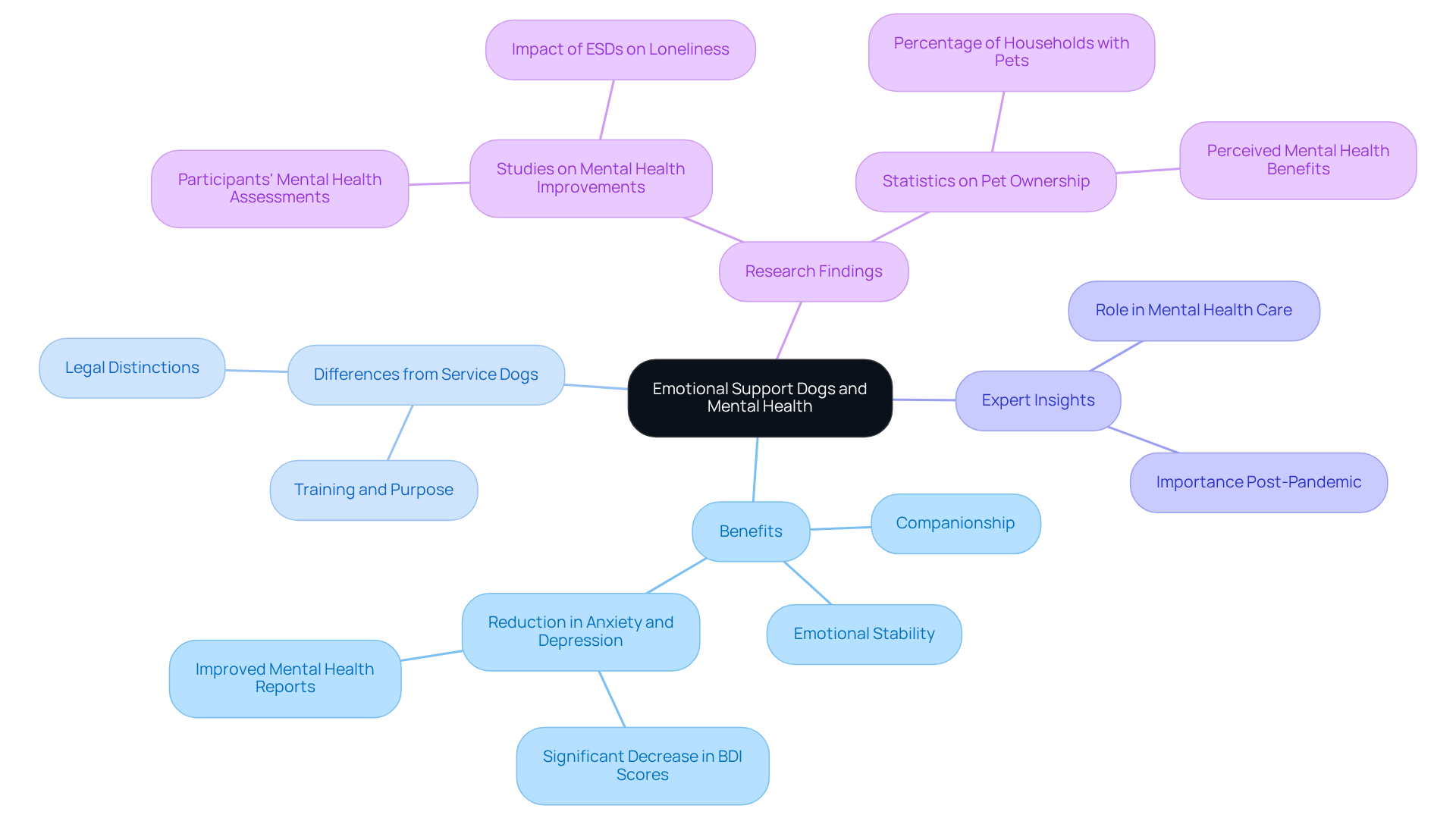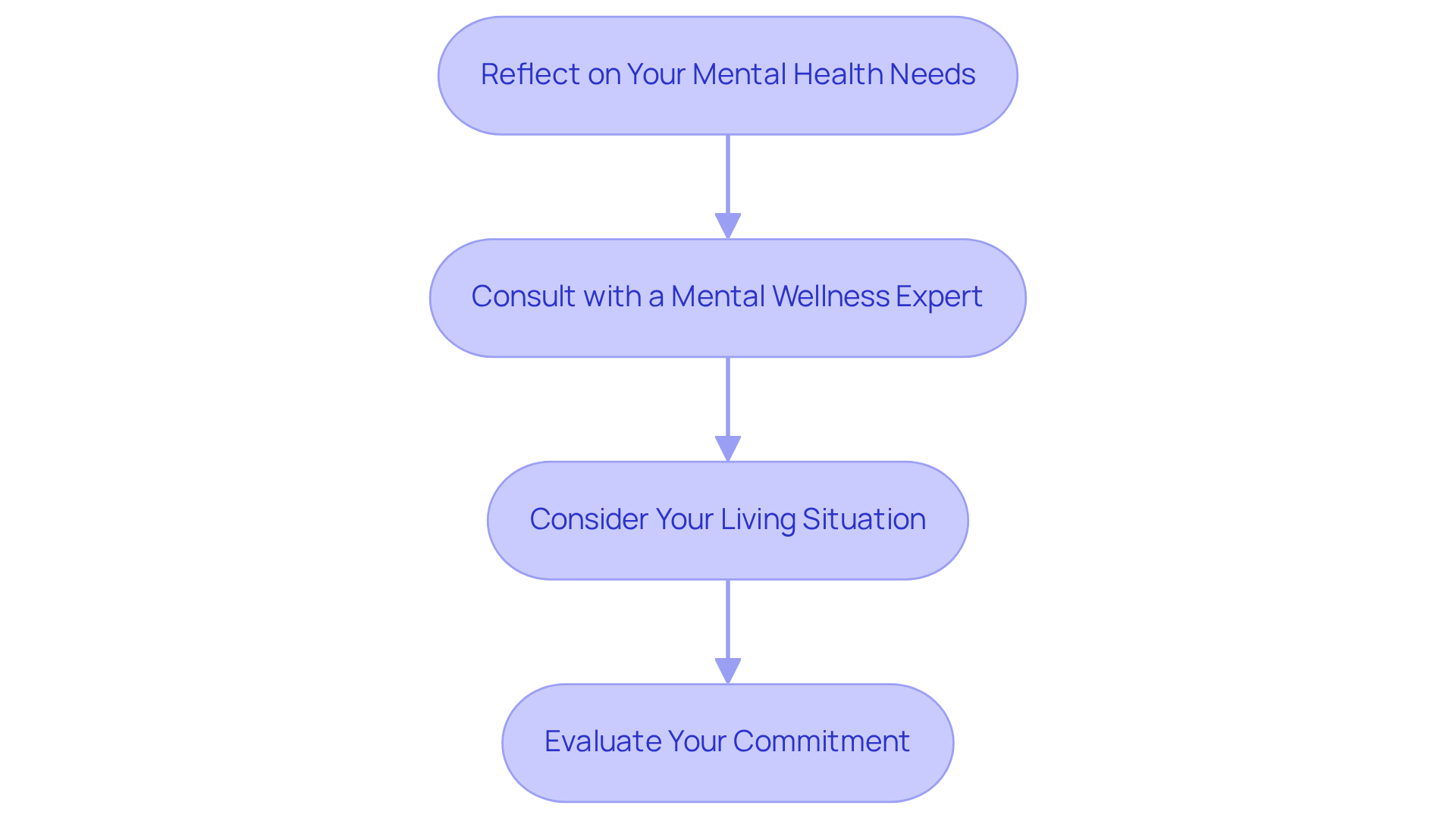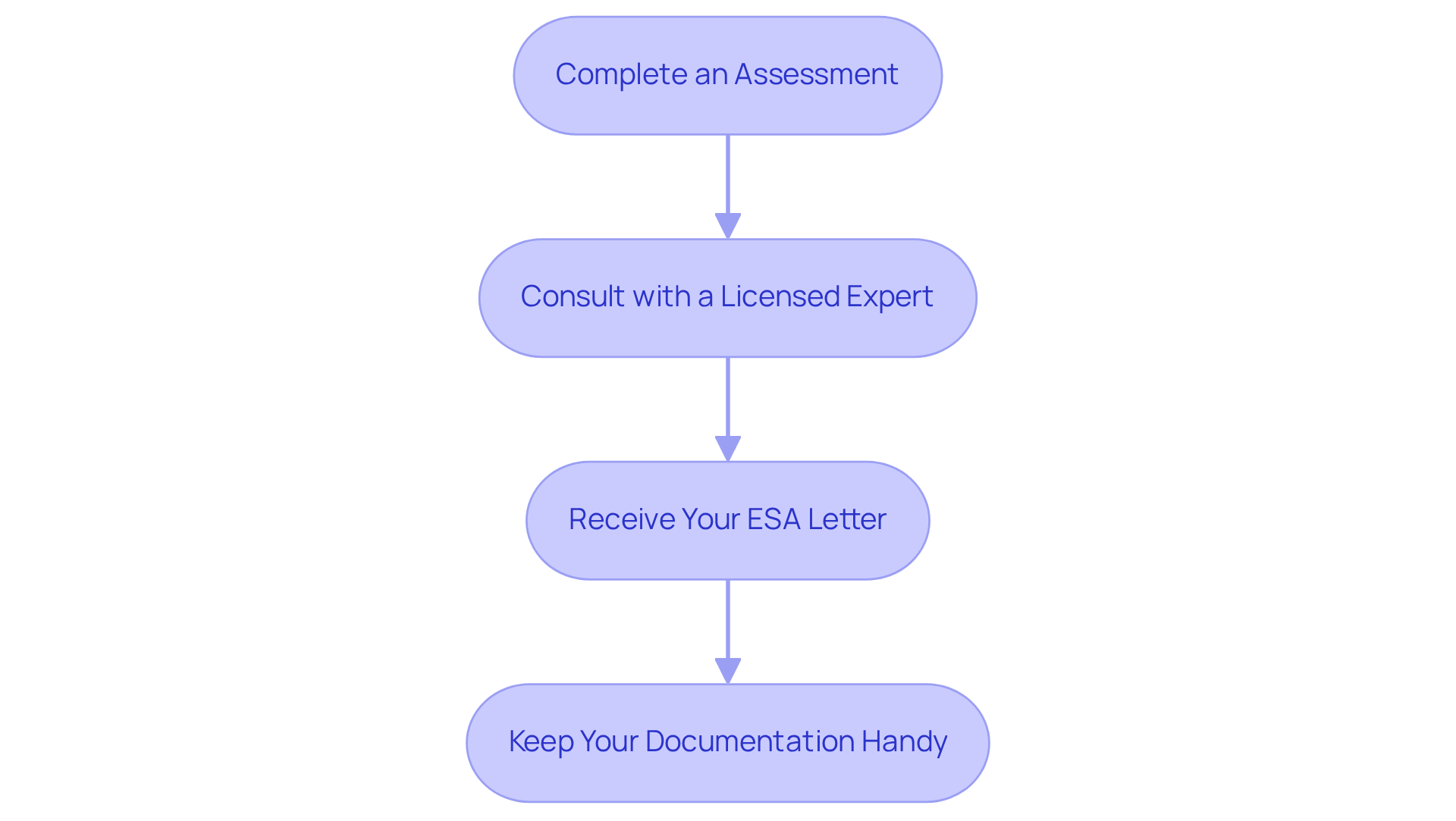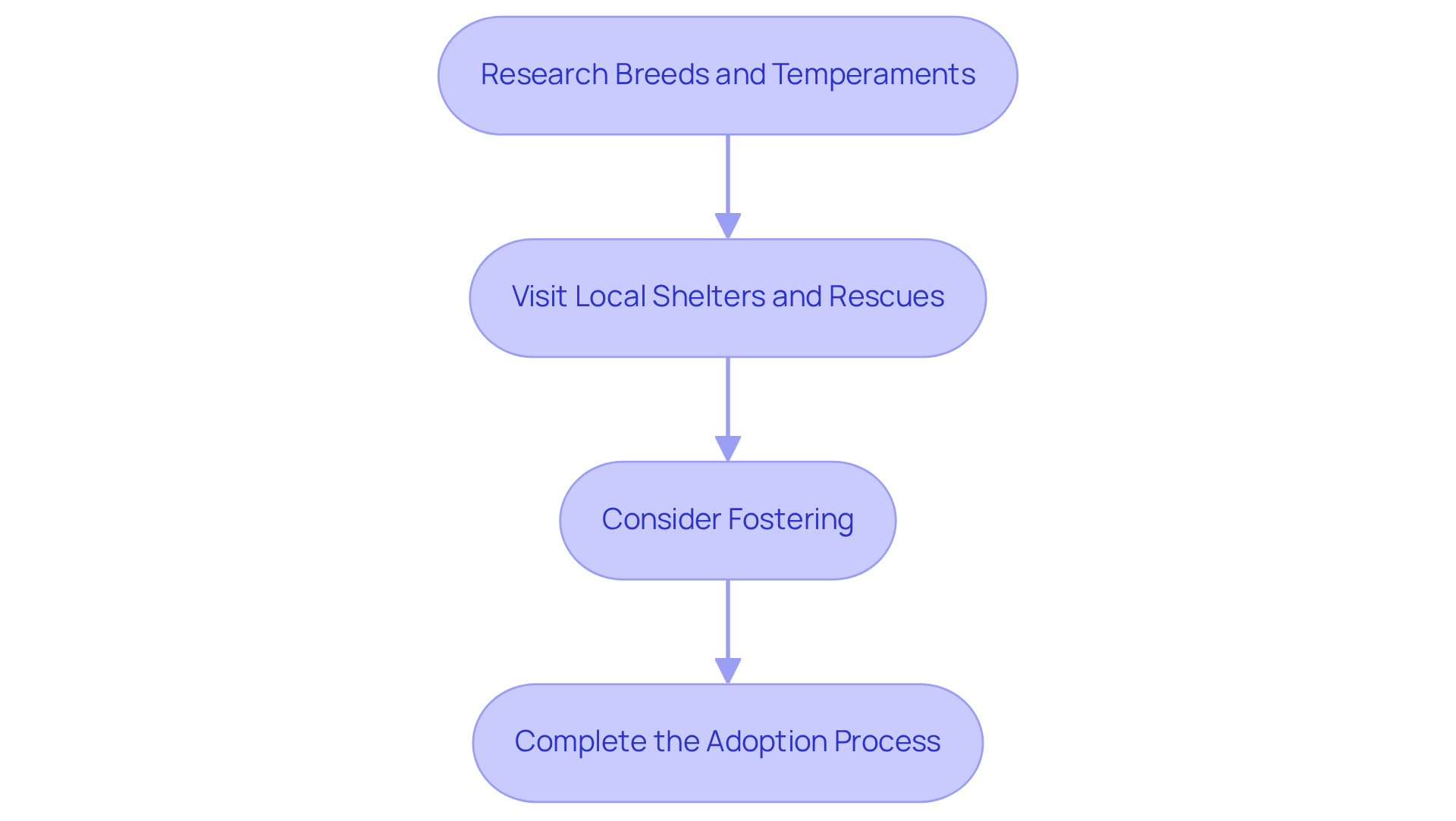

4 Steps to Adopt an Emotional Support Dog Successfully
by Lena Park
Last updated: July 11, 2025
Verified and Approved by:
Angela Morris,
MSW, LCSW
Fact Checked

Overview
This article outlines four essential steps for successfully adopting an emotional support dog, designed to guide you through this important journey. It begins by acknowledging the emotional challenges many face, such as anxiety and loneliness. These feelings can be overwhelming, making it vital to seek support.
- The first step involves assessing your eligibility, which lays the foundation for finding the right companion.
- Next, obtaining an emotional support animal letter is crucial, as it validates the need for your new friend and opens doors to the support you deserve.
- Finally, finding the right dog is a deeply personal decision that can significantly enhance your well-being.
Each step is not just a checklist but a pathway to healing. Research shows that emotional support dogs can lead to reduced anxiety and improved overall mental health. This underscores the importance of careful consideration and professional guidance throughout the adoption process. Remember, you are not alone in this journey; there is support available to help you make the best choice for your emotional needs. As you navigate these steps, take a moment to reflect on how an emotional support dog could positively impact your life, bringing warmth and companionship into your everyday experiences.
Introduction
The bond between humans and animals has long been celebrated, yet few relationships are as transformative as that of an emotional support dog. These unique companions not only provide comfort but also play a crucial role in enhancing mental health for those facing emotional challenges.
Many individuals struggle with feelings of loneliness, anxiety, or depression, and the presence of an emotional support animal can be a beacon of hope. As the demand for emotional support animals grows, understanding the steps to successfully adopt one becomes essential.
What hurdles must be overcome to ensure that both the individual and the dog thrive together? This guide delves into the process of adopting an emotional support dog, offering valuable insights and practical steps to navigate this heartfelt journey, ensuring that you feel supported every step of the way.
Define Emotional Support Dogs and Their Role in Mental Health
Support animals, particularly those that help individuals adopt an emotional support dog, serve as vital companions for those grappling with psychological or emotional challenges. Unlike service dogs, which are trained to perform specific tasks for individuals with disabilities, ESDs primarily offer companionship and emotional stability. Their presence can profoundly ease symptoms associated with anxiety, depression, and PTSD, nurturing a sense of security and enhancing overall well-being.
Have you ever felt the weight of loneliness or despair? Studies indicate that individuals who adopt an emotional support dog often report significant improvements in their mental health, including reduced feelings of isolation and an uplifted mood. For example, research has shown that participants experienced notable decreases in depression and anxiety scores after spending time with their ESDs over a year.
Expert insights underscore the importance of ESDs within mental health care, particularly in the wake of the pandemic, when many individuals are looking to adopt an emotional support dog for additional support. Understanding the unique role of therapy dogs is essential in recognizing their potential benefits, making them invaluable companions for those in need.
Remember, you are not alone in your journey; support is available to help you thrive.

Assess Your Eligibility for an Emotional Support Dog
To determine your eligibility for an emotional support dog, consider these thoughtful steps:
- Reflect on Your Mental Health Needs: Take a moment to evaluate your mental and psychological condition. Are you experiencing anxiety, depression, or other challenges that impact your daily life? Research indicates that individuals who adopt an emotional support dog experience a 25% reduction in anxiety levels due to the secure bond they develop with their pet. This highlights the potential benefits that can arise when you adopt an emotional support dog for your well-being.
- Consult with a Mental Wellness Expert: It’s important to arrange a meeting with a licensed therapist or psychiatrist who can help assess your mental health needs. These professionals often recommend that individuals adopt an emotional support dog to help with issues such as anxiety, depression, and PTSD. Their expertise can provide valuable insights into whether a therapy dog might be a supportive addition to your life.
- Consider Your Living Situation: Ensure that your living environment is suitable for a dog. Check for any pet restrictions in your housing agreement, as many individuals encounter challenges in pet-restricted accommodations. Understanding your rights under the Fair Housing Act can empower you to advocate for your needs effectively.
- Evaluate Your Commitment: Owning a dog is a significant commitment that requires time, effort, and financial resources. Reflect on whether you are ready to embrace the responsibilities of pet ownership, including training, exercise, and veterinary care. Notably, a significant percentage of those who adopt an emotional support dog report that their pets have greatly enhanced their mental health, with 73% rating their effectiveness as an eight or higher on a scale of ten. This underscores the importance of being prepared for the dedication involved in caring for a therapeutic dog.

Obtain Your Emotional Support Animal Letter
Navigating the path to adopt an emotional support dog and obtain your emotional support animal (ESA) letter can feel overwhelming, especially when you’re already facing emotional challenges. But, there is hope and support available to help you through this journey. Here’s a compassionate guide to make the process easier for you.
- Complete an Assessment: Begin by using a reputable service like Wellness Wag to complete a brief assessment that evaluates your eligibility for an ESA. This initial step is crucial in understanding your specific needs and setting the foundation for your support.
- Consult with a Licensed Expert: After your assessment, you will have the opportunity to meet with a licensed mental wellness professional. This consultation is vital, as it allows the specialist to discuss your mental wellness requirements and determine if you need to adopt an emotional support dog. Remember, you are not alone in this; there are professionals ready to support you.
- Receive Your ESA Letter: If you are approved, you will receive your official ESA letter, typically within 24 hours. This letter will include the professional’s qualifications and confirm your need for a therapeutic animal, ensuring it meets legal standards for housing and travel. Adopting an emotional support dog is a significant step toward enhancing your well-being.
- Keep Your Documentation Handy: Once you have your ESA letter, it’s important to store it in a secure location. You will need it for housing applications and travel arrangements. Keep in mind that ESA letters generally expire after one year, so be prepared to renew your documentation as necessary.
Many clients have shared their experiences, noting that effective applications often lead to enhanced mental well-being. They report significant decreases in anxiety and stress levels after welcoming their companion animals into their lives. Testimonials from satisfied clients further highlight the ease and efficiency of the process, reinforcing the importance of choosing a legitimate provider like Wellness Wag. You deserve this support, and it’s within reach.

Find and Adopt Your Emotional Support Dog
Finding and adopting an emotional support dog can be a transformative journey. Here are some heartfelt steps to guide you:
- Research Breeds and Temperaments: It’s important to understand that different dog breeds come with unique temperaments and energy levels. Look for breeds known for their calm and friendly nature, such as Golden Retrievers or Labradors, as they often make wonderful companions for emotional support.
- Visit Local Shelters and Rescues: Take the time to visit local animal shelters and rescue organizations. Interacting with potential dogs can help you assess their behavior and see how they might fit into your life. This connection is key in finding a companion who resonates with your emotional needs.
- Consider Fostering: If you’re uncertain about a specific dog, fostering can be a nurturing option. This allows you to spend time with the dog in your home, helping you both determine if they are the right fit for you to adopt an emotional support dog.
- Complete the Adoption Process: Once you discover a dog that feels right, complete the adoption paperwork and ensure you have the necessary supplies at home. Prepare your living space for this new arrival, and consider enrolling in training classes together, which can greatly assist in your dog’s adjustment and strengthen your bond.

Conclusion
The journey to adopt an emotional support dog transcends the mere act of finding a pet; it is about uncovering a companion capable of profoundly enhancing mental well-being. Emotional support dogs provide invaluable companionship, assisting individuals in navigating feelings of loneliness, anxiety, and depression. By understanding their role and the steps involved in adoption, those in need can be empowered to make informed decisions that positively influence their lives.
This guide has shared key insights, including:
- The importance of assessing personal mental health needs
- Consulting with professionals
- Recognizing the responsibilities that come with dog ownership
Each step, from evaluating eligibility to obtaining an emotional support animal letter and ultimately finding the right dog, plays a vital role in fostering a successful and fulfilling partnership. The statistics reveal the significant benefits of having an emotional support dog, with many individuals reporting remarkable improvements in their mental health.
Ultimately, the process of adopting an emotional support dog represents a meaningful commitment that can lead to transformative changes in one’s life. By taking the necessary steps and seeking the right support, individuals can discover a loyal companion that not only offers comfort but also contributes to a healthier mindset. Embracing this journey can illuminate the path toward a brighter, more hopeful future, reminding everyone that support is available and that companionship can serve as a powerful ally in overcoming emotional challenges.
Frequently Asked Questions
What are emotional support dogs (ESDs)?
Emotional support dogs are animals that provide companionship and emotional stability to individuals facing psychological or emotional challenges. Unlike service dogs, ESDs are not trained to perform specific tasks but primarily offer comfort and support.
How do emotional support dogs help with mental health?
ESDs can significantly ease symptoms associated with anxiety, depression, and PTSD, nurturing a sense of security and enhancing overall well-being. Their presence often leads to reduced feelings of isolation and an uplifted mood.
What evidence supports the mental health benefits of emotional support dogs?
Studies indicate that individuals who adopt an emotional support dog often report significant improvements in their mental health, including notable decreases in depression and anxiety scores after spending time with their ESDs over a year.
Why are emotional support dogs particularly important in the context of mental health care today?
Expert insights highlight the growing importance of ESDs in mental health care, especially in the wake of the pandemic, as many individuals are seeking additional support through companionship from an emotional support dog.
Can emotional support dogs be considered therapy dogs?
While ESDs and therapy dogs both provide support, they serve different roles. ESDs primarily offer companionship and emotional support, whereas therapy dogs are trained to provide comfort in therapeutic settings and may perform specific tasks to assist in treatment.
Certify Your Emotional Support Animal Today

Why You Can Rely on Us?
At Wellness Wag, we believe your pet deserves care rooted in both science and compassion. Each article is carefully researched, written in clear language for pet owners, and then reviewed by qualified professionals to ensure the information is evidence-based, current, and practical for real-life care. Our goal is to help you feel confident in making informed decisions about your pet’s health and well-being.
Reviewed by
Angela Morris, MSW, LCSW
Angela is a licensed clinical social worker with 20 years of experience in patient advocacy and community mental health. She has assisted numerous clients with ESA evaluations and brings a deep understanding of disability accommodations, ensuring that all information is accurate, supportive, and practical.

Written by :
Lena Park
Last Updated :
July 11, 2025












